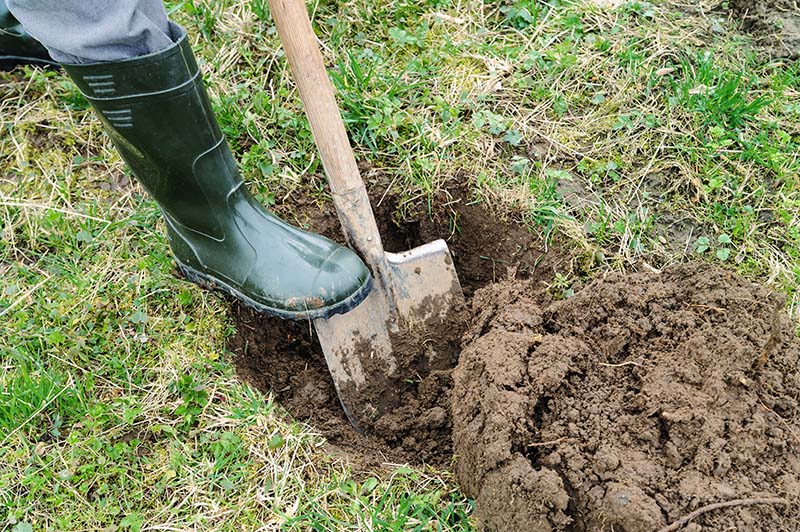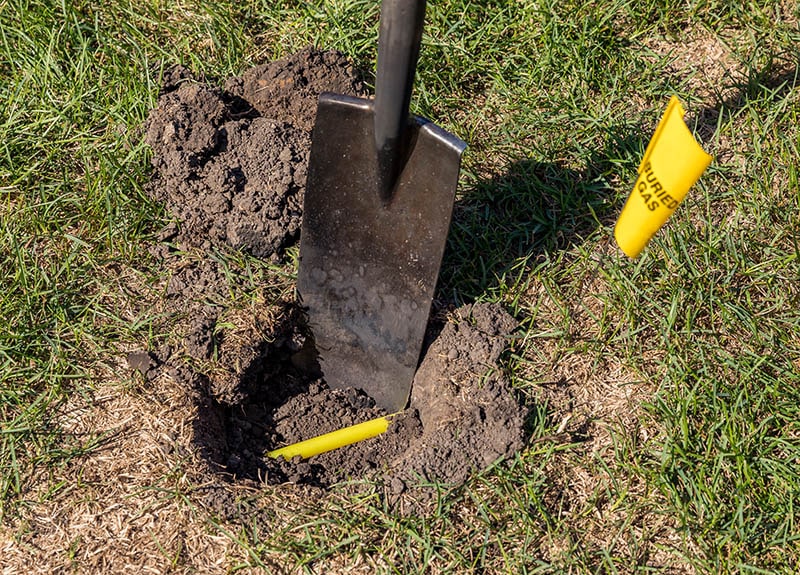How to Find Gas Lines in Your Yard Safely (6 Expert Tips)
-
- Last updated:

Before you start digging for any project in your yard, do yourself a favor and call 811. This is the first step you need to take to stay safe while you’re digging in your yard. But while it’s the first step you need to take, it’s far from the only step.
We’ve highlighted six tips you need to follow to find any gas lines in your yard. But no matter what you do, start by calling 811.

The 6 Expert Tips to Find Gas Lines in Your Yard Safely
1. Call 811

| Importance: | Very high |
| Difficulty: | Easy |
| Effectiveness: | Very high |
If there’s only one piece of advice we can give you when trying to find gas lines, this is it. Call 811, a national utility service, before you dig for anything in your yard. Not only is this an extremely important piece of advice, but you’re also legally required to do so before digging for any project.
Give them a few days to get out to the site after you call too, so don’t wait until the last minute. The exact amount of time before you start digging varies from state to state, so look up the rules for your state before you start digging.
When you call 811, they will come out and mark all public utility lines on your property, including gas lines. But it’s important to note that they’ll only come out and mark public utility lines. They don’t know about private utility lines, and they won’t mark those for you. We can’t overemphasize this enough: call 811 before you dig!
2. Only Gently Dig Near Marks
| Importance: | Very high |
| Difficulty: | Challenging |
| Effectiveness: | Moderate |
When 811 comes out, they’ll put flags near all the utility lines. When digging, stay at least 18 inches away from utility lines on each side. This means there’s a total of 3 feet around each utility line that you shouldn’t dig.
But even then, you need to dig carefully at the 18” mark. Sometimes, lines can shift and sometimes the markings are just a bit off. Digging carefully will help ensure that if you do find something, you won’t plow right through it and create a problem.
3. Use a Rounded Shovel

| Importance: | Moderate |
| Difficulty: | Easy |
| Effectiveness: | Moderate |
When you’re digging, it can be tempting to jump to a pointed shovel that will help you get through the soil faster. And while they do a great job of that, if you’re digging near utility lines or in an area where there might be a utility line, a rounded shovel is the way to go.
While rounded shovels can still damage utility lines, they’re far less likely to do so than a pointed shovel. It’s a simple swap that can save you a ton of frustration and money.
4. Dig With Caution

| Importance: | Very high |
| Difficulty: | Moderate |
| Effectiveness: | High |
Whenever you’re digging in your yard, you don’t want just to assume there’s nothing underneath you, even when you do your due diligence you want to carefully dig so you don’t hit anything. And when you’re digging with caution, even if you hit something, you’re far less likely to damage it, making it safer and potentially saving you a ton of money.
5. Don’t Pry on Lines

| Importance: | Very high |
| Difficulty: | Moderate |
| Effectiveness: | High |
In the unfortunate event that you do find a gas or utility line while you’re digging, the last thing you want to do is pry on it. Ensure you didn’t damage the line, figure out which way it goes, then cover it back up and move the project farther away.
Whatever you do, don’t pry on the line to try and get it out of the way or to put it back in place. This is more likely to cause damage than to fix anything.
6. Hire a Professional

| Importance: | Varies |
| Difficulty: | Varies |
| Effectiveness: | Very high |
If there are a ton of buried lines in your yard or if you’re not quite sure if there are private utility lines in your yard, we highly recommend hiring a professional to find them. Professionals can use high-end equipment to track down lines under the ground.
While you can purchase this equipment yourself, it costs thousands of dollars, so if you’re completing a one-time project, hiring a professional is usually the more cost-effective solution.

Why Finding Gas Lines Is So Important
When you’re digging in your yard, the last thing you want is to find a gas or utility line after you dig into it. For starters, there are serious safety and financial implications if you damage an underground line. Digging into a gas line can cause a spark, which can lead to a fire and explosion for everyone using that gas line.
That means hitting one gas line can cause tons of deaths and damage. If you dig into electrical lines, you can electrocute yourself, water and plumbing lines can lead to flooding and unpleasant odors, and sewer lines can lead to dangerous methane leaks.
If you damage any of these lines, you’ll need to pay quite a bit for a professional to come out and fix them, and you risk serious fines depending on the state you live in. Fines for failing to call 811 and damaging a utility line range from $4,000 to $50,000 for a single incident, depending on the extent of the damage and where you live.

Conclusion
If you’re digging in your yard, please call 811 before you start digging. It might seem like a small thing but calling before you dig can save you a ton of money and frustration, and it can even save your life. From there, stay clear of any lines they mark and dig carefully around the rest of your yard.
When it comes to buried gas, lines don’t take any chances, it’s just not worth the risk!
Featured Image Credit: Kathy Piper, Shutterstock
Contents


